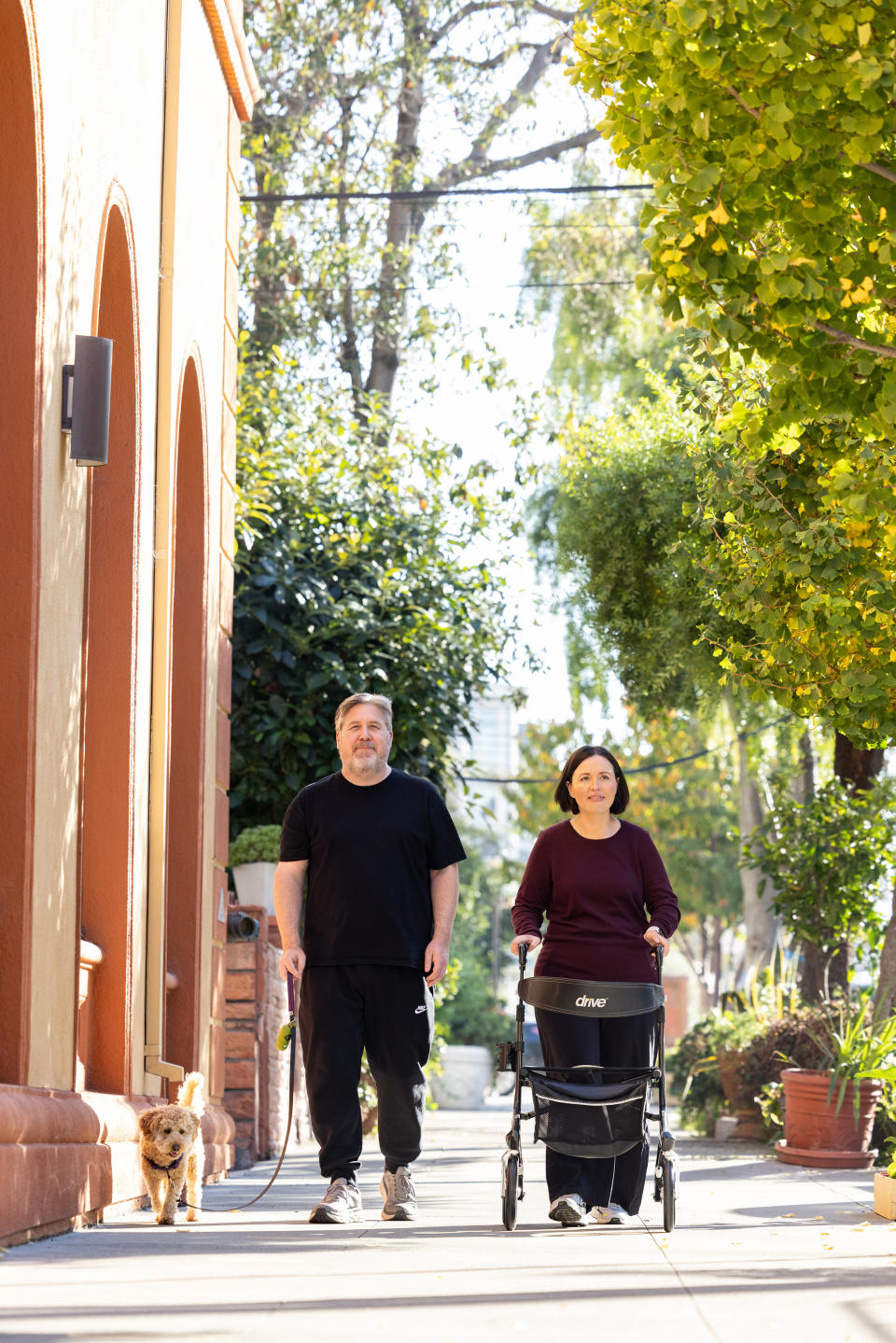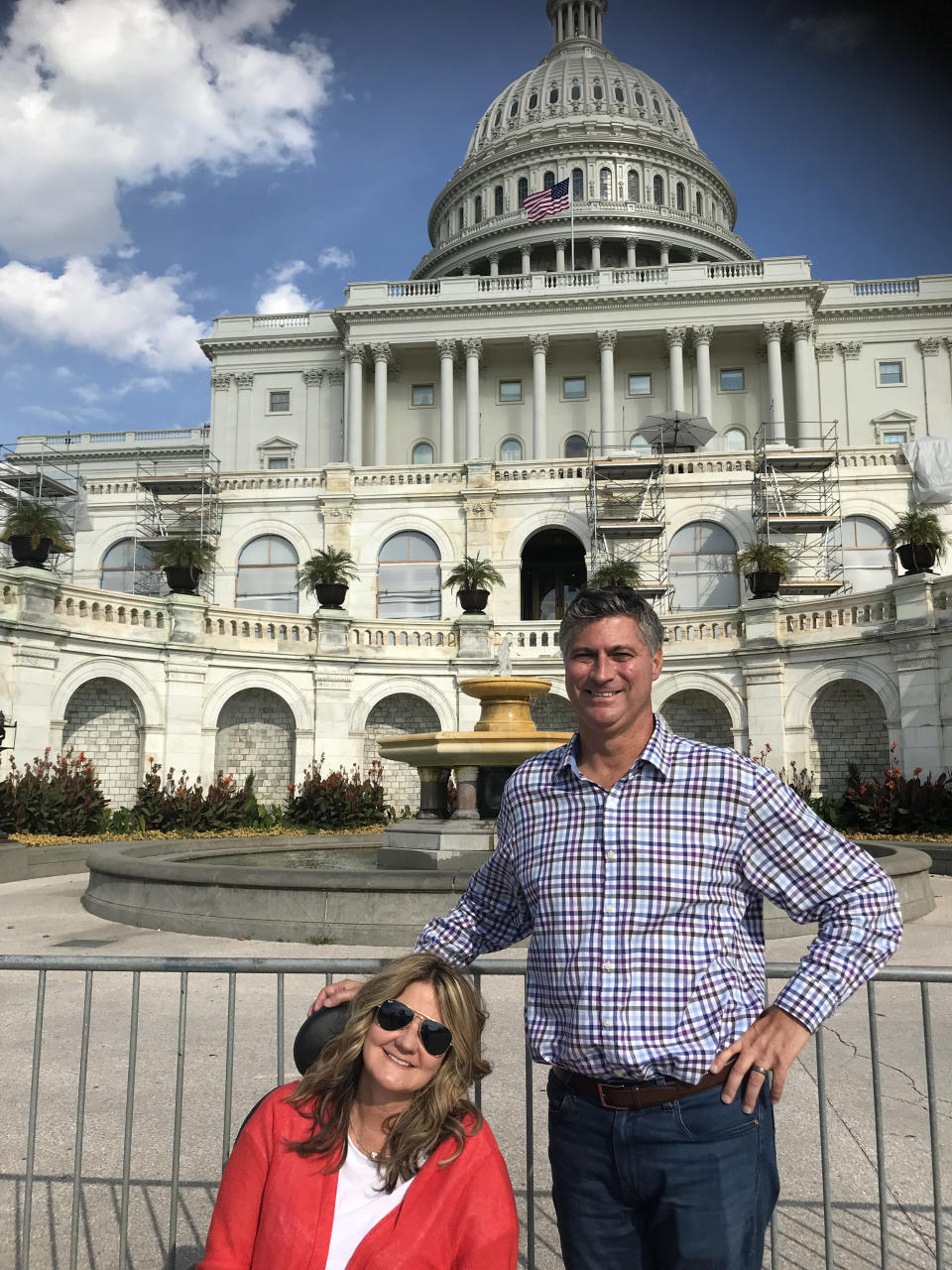ALS patients with months to live are fighting for better treatments
Several years ago, Gwen Petersen noticed that when she walked, her left foot would catch on the ground. She kept falling and each tumble was more severe. Her balance and coordination felt off but even after repeated emergency room trips, doctors had no answers. She was diagnosed with anxiety, but that didn’t seem right.

“I was told, ‘Well, you have so much going on. You’re planning your wedding, you’re starting a new job,’” Petersen, 36, of Southport, Connecticut, told TODAY. “You don’t trip and fall from anxiety.”After 18 months, she learned she had ALS, short for amyotrophic lateral sclerosis, aka Lou Gehrig’s disease. While she was stunned by receiving the diagnosis at such a young age, it encouraged her to become a patient advocate, urging government agencies and pharmaceutical companies to fast-track developing a drug that can slow the progression of the fatal condition, which leads nerve cells to break down, reducing muscle function. Its cause is unknown.
“Time is not on our side in this disease,” she said. “We’re still lacking the speed and urgency that we deserve.”
Between 15,000 and 20,000 people in the U.S. have ALS, according to the Centers for Disease Control and Prevention.

Act for ALS
Soon after Brian Wallach was diagnosed with ALS in 2017 at age 36, he started the nonprofit I Am ALS with his wife, Sandra Abrevaya. Prior to his diagnosis, he worked in the Obama administration and as a federal prosecutor. The average survival time with ALS is two to five years, according to the ALS association, and Wallach has already exceeded it.
Like so many others with ALS, he wants more time and hopes to watch his daughters grow up. Wallach and Abrevaya lobbied Congress to pass Act for ALS, a bill that accelerates treatments for disease, which President Joe Biden signed in late 2021. While this is an important first step, the couple isn’t slowing down.
“We need a little sustenance,” Wallach, 41, of Chicago’s suburbs told TODAY with the help of Abrevaya. ALS makes his speaking voice sound soft. “The only thing that (we) want is to have (the legislation) move faster.”

Earlier this year, Congress dedicated $25 million for an expanded access grant program, which allows people with ALS access to treatments in phase 3 clinical trials. After this appropriation, many companies applied, and patients should know by September what’s approved, Wallach said.
“Once we have the programs approved, we will be able to see lots of patients currently excluded from clinical trials actually receive these treatments. We will be able to learn from the (expanded access program) about the efficacy and the impact of these treatments on a portion of a population that has been traditionally ignored,” Wallach explained. “The only thing is that they have to move it faster.”
"The vast majority of patients with this disease have limited access to therapies because they can’t get into clinical trials,” Abrevaya, 41, added.

The inspiration for ACT for ALS came from Wallach’s observations around expanded access programs for cancer medications, which have been successful for many patients, but these programs haven't been used for neurological diseases, he said.
“So the hope was by having this pilot program in ALS, we can show the government and FDA or NIH research that it is possible to do this in ALS,” Wallach said.
Lags in treatment approval
Earlier this month, the Food and Drug Administration announced it was delaying its deadline for approving the drug AMX0035 by three months to late September, Reuters reported. A clinical trial has shown it extends lifespan for several months, Dr. Sabrina Paganoni, co-director of the Massachusetts General Hospital Neurological Institute, who's conducting clinical trials for the drug, told TODAY.
In March, a panel of outside advisers to the FDA voted not to approve the drug, citing a lack of "substantial evidence of effectiveness" and recommending a second study. "The findings with AMX0035 appear promising, however, we have considerable concerns that the data may not be sufficiently robust to meet the approval standard for substantial evidence of effectiveness," said Dr. Teresa Buracchio, director of the FDA's Division of Neurology 1, at the March meeting.
Paganoni told TODAY that the FDA’s need for extra time is part of the process.
“I take it as a positive sign that there’s going to be additional review and additional time because I think that the … data is very strong,” Paganoni said. “It’s just a matter of digesting all the data and reviewing the data from different perspectives that will allow the FDA to ultimately make the final decisions. These are really complex decisions, and I really respect everyone’s time.”
Amylyx, the maker of AMX0035, said in a statement after the delay: “We remain engaged with the FDA to advance AMX0035 through the review process as efficiently as possible. We are pleased that the members of the advisory panel will review additional analyses from our clinical studies, including recently published analyses, supporting the previously reported functional and overall survival benefit for AMX0035. As we have heard from the ALS community, there is a crucial need for new and effective treatments in ALS, and our team will continue to work around the clock to advance treatments for ALS in the U.S."
Multiple ALS patients told TODAY the delay was concerning, and Wallach said that if the treatment isn't approved soon, the ALS community will have a "massive problem with the FDA. ... For an ALS patient, every month matters. So what we want to see is that the FDA is using their flexibility and any urgency that they promised us, but we have not seen it from them yet.”
The FDA did not respond to TODAY's request for comment.
Paganoni said the phase 2 clinical trials showed that the drug was “safe and well tolerated.”
“What we saw was a 25% slowing or decline, so the drug did not stop and did not reverse the disease. People didn’t necessarily improve their function. However, the progression of the disease was significantly slower," she said.
“During that ... trial, people who received the drug were able to retain functions like walking, breathing on their own, feeding,” Paganoni continued. “When we follow the participants for long term, we found that people who were started on the AMX0035 compared to people who were started on a placebo live about five months longer, which, in a disease that has a very limited lifespan, is significant.”
The drug is currently in a phase 3 clinical trial with many patients in Europe, Paganoni explained. If the FDA does not approve its use in September, patients will have to wait for the results from the larger trial not expected until 2024, she added.
Sandy Morris, who was diagnosed with ALS in 2017 when she was 51, also wishes the FDA would act with more urgency.

“With the FDA leaders taking such a long time to approve AMX0035, it sadly has had a negative impact on the ALS community,” the 56-year-old from Sierraville, California, told TODAY in an email. She added that she's worried that the FDA's scrutiny of AMX0035 will discourage other drugmakers.
“If we have a drug that ... showed better survival rates, and the FDA leaders are still scrutinizing that trial as if it failed, other sponsors may pull away from this space if they don’t think it’s worth it to be here. And that concerns me more than anything else," she said.
Less placebo, more medicine
Soon after Morris’ diagnosis, she began advocating for changes around clinical trials for ALS medications. Clinical trials usually give a certain amount of participants a placebo and not the experimental treatment, and generally people don’t know until after the study who received the placebo and who received the actual drug. This approach is considered the gold standard for clinical trials, but because ALS has no cure and progresses quickly, patients in trials wanted more access to experimental therapies instead of being siloed into a placebo group, according to Morris.
(The clinical trials of AMX0035 have some participants take a placebo, but they’re permitted to take other medications and continue to receive the standard of care, a spokesperson told TODAY.)
“It was absolutely absurd, and they’ve changed a good amount of that,” Sandy Morris’ daughter, Kylan, told TODAY of clinical trial practices. ALS impacts Sandy Morris’ ability to speak, so her daughter helps her at times. Sandy Morris also uses eye tracking software.
"Mom’s big thing is we ... deserve less placebo, less observation time,” Kylan Morris added.

Petersen added that she wants the FDA to move as rapidly with ALS treatments as it has with other conditions, such as Alzheimer’s or Duchenne muscular dystrophy.
“We’ve seen the FDA act with speed or urgency or regulatory flexibility,” she said. “We in ALS are merely asking for the same.”
Petersen also wants the general public to gain a greater understanding of the type of patients ALS impacts.
“Our mission is to dispel the myth that ALS is an old white guy’s disease,” she said. “It’s been super important for people who look like me, in their 30s, getting married, wanting to start a family to speak out and to advocate.”
Morris, too, is not backing down and feels exhausted by the inaction.
“Mom and her group are so tired of words,” Kylan Morris said. “They’re looking for action.”
CORRECTION (July 26, 2022, 9:01 a.m.): A previous version of this story misstated the definition of double-blind study design. A double-blind study means neither the participant nor researcher knows which participants received a placebo or the medication. It does not mean half of participants receive a place and half received the drug being tested.

